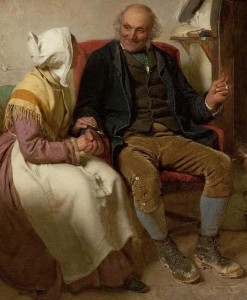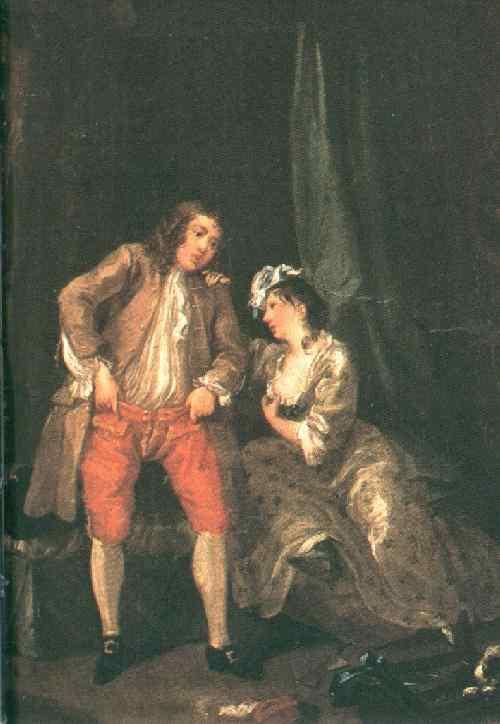John Anderson, my jo (scottish song): Robert Burns and traditional versions
John Anderson was a carpenter/musician, friend of Robert Burns (1759-1796) and his peer. Two variations are known about the piece: a previous bawdy version contained in “The Merry Muses of Caledonia” and a more intimate version of only two stanzas that speaks of love (or friendship) between two elderly people.
John Anderson era un falegname/musicista, amico di Robert Burns (1759-1796) e suo coetaneo. Del brano si conoscono due varianti: una versione erotica contenuta in “The Merry Muses of Caledonia” e una più intimista di due sole strofe che parla dell’amore (o dell’amicizia) tra due persone anziane.
JOHN ANDERSON, MY JO (Robert Burns)
This version written by Burns was published in “The Scots Musical Museum” in 1790. The matching melody is “Town Piper of Kelso” transcribed in 1578 in the Queen Elizabeth’s Virginal Book.
It was read as the poet’s homage to love in old age, even though Burns never grew old, yet he also knew how to interpret the feeling of friendship and sharing of affections between two people at the end of a long journey together who are serenely waiting to take the last step towards eternal rest. Burns was 30 when he wrote this poem, dedicating it to the friend of his youth (who lived until late in life).
Thomson in the 1826 edition of the “Select Collection” published it with the arrangement of the German composer Carl Maria von Weber.

La versione scritta da Burns è stata pubblicata in “The Scots Musical Museum” nel 1790. La melodia abbinata è “Town Piper of Kelso” trascritta nel 1578 nel Queen Elizabeth’s Virginal Book.
John Anderson, my jo è un brano considerato l’omaggio del poeta all’amore nella vecchiaia. Sebbene Burns non sia mai diventato vecchio, ha saputo farsi interprete anche del sentimento di amicizia e condivisione degli affetti tra due persone anziane. Alla fine di un lungo cammino percorso assieme serenamente attendono di compiere l’ultimo passo verso il riposo eterno. Burns aveva 30 anni quando scrisse questa poesia, dedicandola all’amico della gioventù (che visse invece fino alla tarda età).
Thomson nell’edizione della “Select Collection” del 1826 la pubblicò con l’arrangiamento del compositore tedesco Carl Maria von Weber.

per voce, flauto, violino, violoncello & piano
| Robert Burns SMM 1789 I John Anderson, my jo (1), John, When we were first acquent; Your locks were like the raven, Your bonnie brow was brent; But now your brow is beld (2), John, Your locks are like the snaw; But blessings on your frosty pow, John Anderson, my jo. II John Anderson, my jo, John, We clamb the hill thegither; And mony a cantie day, John, We’ve had wi’ ane anither: Now we maun totter down, John, And hand in hand we’ll go, And sleep thegither at the foot (3), John Anderson, my jo | traduzione italiana Cattia Salto I John Anderson, mio caro, John, quando dapprima c’incontrammo, i tuoi riccioli erano corvini, la tua bella fronte era liscia; ma ora sei stempiato, John, e i riccioli tuoi son come neve; eppure benedico la tua testa bianca, John Anderson, mio caro. II John Anderson, mio caro, John, scalammo la collina insieme; e molti lieti giorni, John, abbiamo passato insieme: ora, barcollando, dobbiamo scendere, John, e mano nella mano alla fine della china dormiremo insieme, John Anderson, mio caro. |
NOTE
English translation
1) Jo (joy) è una vecchia parola scozzese per innamorato, anche come vezzeggiativo “mio caro”, mio tesoro
2) beld=bald, si riferisce a una testa calva, ma qui si sta parlando di fronte, immagino si voglia riferire alla scriminatura alta tipica di chi perde i capelli per la vecchiaia
3) letteralmente “dormiremo insieme ai piedi della collina”
JOHN ANDERSON (MERRY MUSES OF CALEDONIA)
The second version is the erotic one of the popular tradition (the bawdy ballads) and was collected by Burns in “The Merry Muses of Caledonia” for the convivial meetings of the Fencibles Crochallan, a men-only club located in a medieval alley in Edinburgh (Anchor close), assiduously frequented by Burns during his stay in Edinburgh, one of the typical “very British” convivial associations where male members met to be in company and in freedom, away from wives and other women, to eat well, drink a lot, to smoke in peace and to “discuss” men’s things.
“The ballad of which there are several stanzas already before the second half of the eighteenth century, is written from the female point of view: his wife reprimands John for his sexual impotence, reminds him of his past ardor and threatens to cheat on him!
La seconda versione di “John Anderson, my jo” è quella erotica della tradizione popolare (le bawdy ballads) ed è stata collezionata da Robert Burns in “The Merry Muses of Caledonia” per le riunioni conviviali del Fencibles Crochallan, un club per soli uomini ubicato in un vicoletto medievale di Edimburgo (Anchor close), assiduamente frequentato da Burns durante il suo soggiorno edimburghese, una delle tipiche associazioni conviviali “very british” in cui i soci maschi si ritrovavano per stare in compagnia e in libertà, lontano dalle mogli e le altre donne, per mangiare bene, bere parecchio, fumare in santa pace e “discutere” di cose da uomini.”
La ballata di cui si hanno diverse strofe già prima della seconda metà del Settecento, è scritta dal punto di vista femminile: la moglie rimprovera John per la sua impotenza sessuale, gli ricorda i suoi passati ardori e lo minaccia di mettergli le corna se non si darà da fare!

Before the Seduction and After
I
John Anderson, my jo, John
I wonder what you mean
To lie sae lang in the morning
And sit sae late at e’en
Ye’ll bleer a’ your een, John
And why should you do so?
Come sooner tae your bed at nicht [een]
John Anderson, my jo
II
John Anderson, my jo, John
When that ye first began
Ye had as good a tail-tree
As any ither man
But now its waxen wan, John
And wrinkles to and fro
I’ve twa gae-ups for ae gae-doon (1)
John Anderson, my jo
III
I’m battered (backit) like a salmon (2)
I’m breasted (breastit) like a swan
My wyme (wame) is like a down-cod (3)
My waist (middle) he well may span (4)
My skin from top to toe (5), John
Is like the new-fa’en snow
And it’s all for your convenience here
John Anderson, my Jo.
IV
Oh it’s a fine thing John
To stay out all the night (6)
It’s a finer thing, John
To see your hurdies fyke
To see your hurdies fyke, John
And strike the rising blow
Then I like your chanter-pipe (7)
John Anderson, my Jo.
V
When ye begin to come (8), John
See that ye come your best
And when ye start to haud (9) me
See that ye haud me fast
See that ye haud me fast, John
Until that I cry oh
Your back shall crack ere I do that (10)
John Anderson, my jo
VI
John Anderson, my jo, John
Ye’re welcome when you please
It’s either in the warm bed
Or in aboon the claes
Or ye shall bear the horns, John
Upon your head to grow
And that’s the cuckold’s mallison
John Anderson, my jo
I
John Anderson, mio caro, John
mi chiedo che intenzioni hai
per riposarti così a lungo al mattino
e stare seduto fino a sera tardi
anche se ti si socchiudono gli occhi, John,
perché fai così?
La sera vieni a letto prima
John Anderson, mio caro
II
John Anderson, mio caro, John
quando eri giovane
avevi un buon “palo”
come ogni altro uomo
ma ora è molliccio, John
tutto raggrinzito
..
John Anderson, mio caro
III
Sono lentigginosa come un salmone
il mio seno è morbido come quello del cigno
il mio ventre è come una conchiglia chiusa
la mia vita potresti tenere tra le mani,
la mia pelle dalla testa ai piedi, John
è come la neve appena caduta
ed è tutto a tuo comodo
John Anderson, mio caro
IV
Oh è una bella cosa John
stare fuori tutta la notte,
ma è una cosa ancor più bella John
vedere le tue anche agitarsi
vedere le tue anche agitarsi, John
e sferrare il colpo
allora mi piace il tuo piffero
John Anderson, mio caro
V
Quando inizi a “venire”, John
vedi di fare del tuo meglio
e quando inizi a prendermi
vedi di prendermi presto
vedi di prendermi presto, John
fino a quando non griderò oh
la tua schiena deve rompersi prima che io lo faccia,
John Anderson, mio caro
VI
John Anderson, mio caro, John
sei il benvenuto quando vuoi
sia nel calduccio del letto
oppure in piedi con i vestiti addosso
o tu porterai le corna, John
che cresceranno sulla tua testa
e che sono la maledizione del cornuto
John Anderson, mio caro
NOTE Traduzione italiana Cattia Salto
1) In Greig, Scots Ministrelsie Vol 1, 1893 il verso dice: “And oft requires my helping hand” in italiano: “e spesso richiede l’aiuto della mia mano”; meno chiaro mi è il senso di “I’ve twa gae-ups for ae gae-doon” letteralmente “io ho due su, per uno giù”
Scrive Jim Bainbridge su Mudcat: “the lines are about his failure to ‘keep up’ with the woman in the sexual act- the ‘tail-tree’ mentioned earlier in that verse. For her two movements he only has one”
2) letteralmente maculata come un salmone, vuol dire che ha il volto ricoperto di lentiggini?
3) tra le varie traduzioni prospettate nel SND
4) cioè ha il vitino di vespa
5) oppure Frae my tap-knot to my tae
6) oppure To keep out o’er the dyke
7) John è un suonatore di cornamusa che passa le serate a rallegrare le feste con la sua musica, ma la moglie preferirebbe che restasse a casa a rallegrare lei con il suo strumento
8) nella versione più esplicita dice “And when we start to fuck, John,”
9) oppure “When you begin to plough me”
10) oppure “ere I cry slack”
LINK
http://www.springthyme.co.uk/songtexts/JohnAndersonMyJo.html
http://www.robertburnsfederation.com/poems/translations/john_anderson_my_jo.htm
https://en.wikisource.org/wiki/The_Book_of_Scottish_Song/John_Anderson,_my_jo
https://en.wikisource.org/wiki/The_Merry_Muses_of_Caledonia/John_Anderson_my_Jo
http://www.joe-offer.com/folkinfo/songs/657.html
https://mudcat.org/@displaysong.cfm?SongID=3224
https://mudcat.org/@displaysong.cfm?SongID=3226
https://mudcat.org/@displaysong.cfm?SongID=3225
http://www.celticlyricscorner.net/sileas/john.htm
https://burnsc21.glasgow.ac.uk/john-anderson-my-jo-gt
